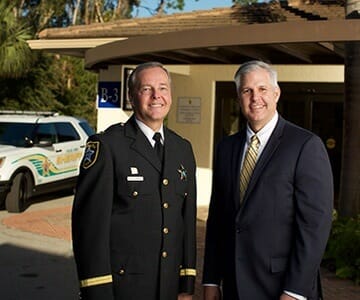
Our Partnership with David Lawrence Centers is a Win-Win
All of us are stakeholders when it comes to addressing mental illness and addiction issues in our community. This is one of the reasons I became a member of the David Lawrence Centers Board of Directors.
We at the Collier County Sheriff’s Office, as well as other law enforcement agencies around the nation, have seen an increase in the number of interactions with those affected by both mental illness and addiction in recent years. As law enforcement officers, we don’t want to send individuals to jail if there is a better alternative that helps them obtain proper treatment. CCSO partners with DLC to avoid unnecessary jail time for those struggling with mental illness and substance use.
Back in 2008, we began Crisis Intervention Team (CIT) training for agency members. The program teaches deputies how to de-escalate situations and divert those in need of treatment into programs. Since we began the program, about 1,000 people have received the training and more than half of those were deputies. My goal is for 100 percent of our deputies to receive this training.
Over the years, the CCSO has also seen an increase in the number of people going to DLC through the Baker Act. Perhaps surprisingly, those statistics include children. That’s why I support DLC’s emphasis on expanding its children’s crisis unit. Mental health and substance use issues can have a lasting impact on children and teens that extends well into adulthood. The sooner we can initiate treatment, the better off those affected individuals will be.
Too often the correctional system becomes the primary institution for people who are actually in need of mental health and addiction treatment. Part of the reason has to do with the decrease in state mental hospitals and inpatient treatment options. For our part, here in Collier County, we focus on jail diversion initiatives once an arrest is made. We send these offenders through treatment courts, which differ from standard criminal courts because their main goal is to provide treatment options. Sometimes these treatment courts can decriminalize nonviolent actions that are actually a byproduct of mental illness or addiction. Doing this reduces our incarceration rates and more directly addresses the needs of those who have been arrested.
Back in November, North Collier Fire Chief Jamie Cunningham and I asked members of our legislative delegation to create a law that would allow hospitals to share certain information about drug overdoses with first responders. That information would include the types of drugs causing overdoses as well as the number of overdoses hospitals are treating, to give first responders a better picture of drug use trends in their communities and how to address them. Ideally, such a law would not make public the names or identifying information of those who are being treated for overdoses.
I also asked the state to devote resources to community-based mental health and substance use support programs. A lack of treatment options and funding sources for sufferers of mental illness has resulted in our jails evolving into the largest mental health facilities in our communities. Support at the state level would ease the burden on jails, aid in the process of getting the right treatment to the right person, reduce recidivism and enhance public safety.
As your sheriff and as a DLC board member, I remain committed to connecting our citizens with the resources that will help them become productive members of our community. By working together, we are keeping Collier County a great place and a safe place.
Jan 04, 2017 | Blog



